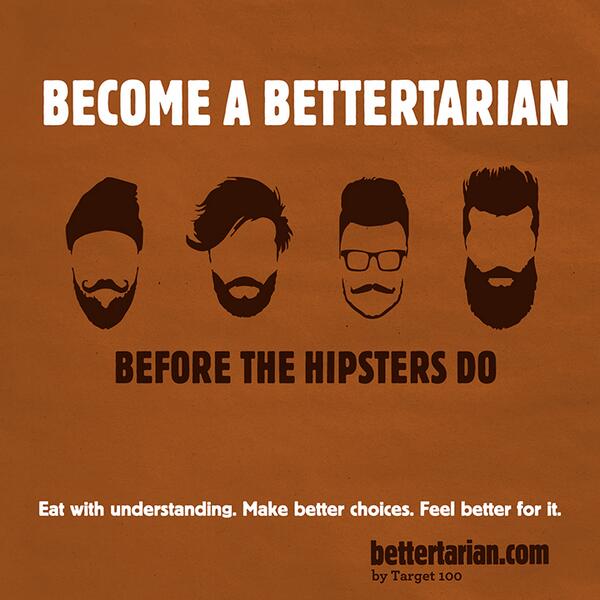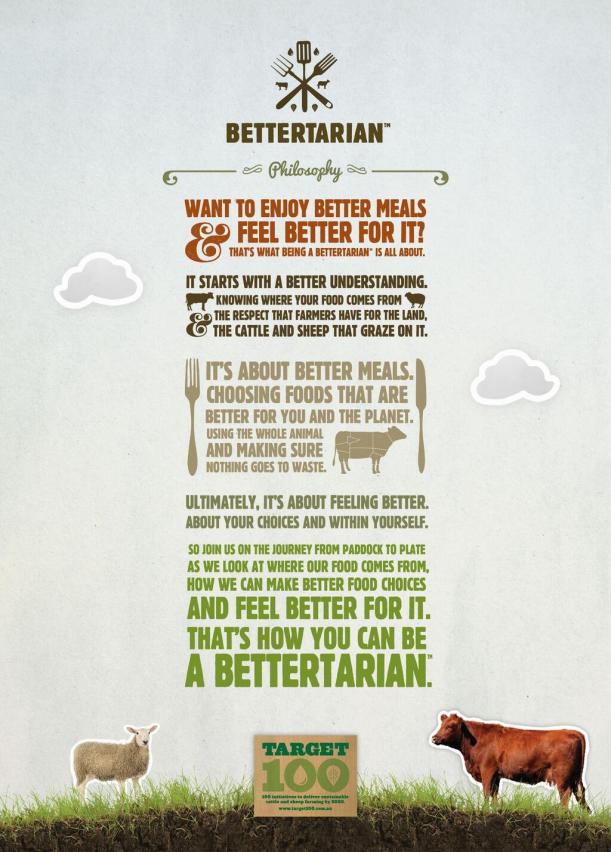I love having friends from around the world – it’s the best way to broaden your horizons about what is happening in different countries! My friend Brooke (hi!) pointed me towards the Bettertarian campaign that was recently launched by Meat and Livestock Australia. It’s a pretty comprehensive website that argues for abolishing inflexible diet labels (such as vegetarian, fruitarian, paleo, etc.) and rather make ‘better’ choices by researching and understanding your meat.
http://www.youtube.com/watch?v=zg-9gfVebFM
On their website, they feature a three-part video series of inviting three consumers from the Australian mainland to Tasmania onto a sheep and cattle farm to experience livestock farming first hand. So far, so good – I am a huge advocate for ‘getting to know where your meat is from’, and the farmers and ‘sustainable food advocates’ seemed open-minded enough. What I didn’t like is how the very valid questions by the customers (“would it be helpful if we paid a little more for our meat and consumed a little less?” “How do you combine maximizing your land value with ensuring sustainability”) seemed to be addressed very superficially. Also, the way that at the end of the videos these ‘critical’ consumers seemed ‘converted’ to the mindset that, in fact, there is no dilemma concerning meat production and sustainability was a little dubious to me and negated the whole point of opening up a dialogue in my opinion. There was no discussion about better vs. worse practices and no open talk about challenges that the industry faces. While I applaud the efforts undertaken by the Target 100 project, the umbrella project that this campaign was launched under, only focusing on the cutting-edge marginal improvements and equated one (very nice-looking) farm with the entirety of the Australian cattle industry seems disingenuous to me.
Let’s talk more about the Target 100 project, though. Its goal is to put a spotlight on and to disseminate 100 initiatives to deliver sustainable cattle and sheep farming in Australia by 2020. This project actually has done a tremendous job in outreach as well – their website is beyond impressive and the initiatives span a number of issues reaching from animal welfare to climate, water and energy concerns. They even provide sustainability study guides for schools (although in which way that is trying to give one particular viewpoint is a different question. I think it would be great when presented as ‘this is the view of the cattle industry on water/sustainability issues’ rather than ‘these are water/sustainability issues’).
Overall, I do like the approach of more communication between the industry and the end consumer, particularly around issues in the public debate such as the sustainability of meat production. I also like some of the messaging provided by the #Bettertarian campaign, such as ‘don’t waste parts of the animal’ and ‘inform yourself where your meat comes from’. However, simply watching these videos doesn’t necessarily mean that you are making a “better” choice in the supermarket when buying any type of Australian beef or lamb piece. Consider the message on the poster below – All things equal, meat simply isn’t the “food that is better for you and the planet” – I’m writing a whole thesis about the research showing otherwise. And if that is how the message is understood by consumers, it’s a successful marketing strategy for the country’s livestock industry, indeed.
What do you think of the campaign? Awareness raising or marketing plot?


I think your cynicism is well placed. But as I was shopping today, I looked at the meat cabinet, and thought, not everyone is going to give up meat. So for those people who are choosing to eat it, perhaps this campaign is a step in the right direction?